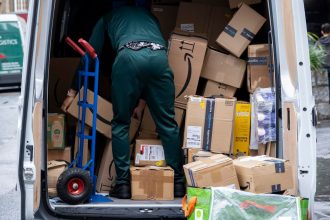- UK’s sanctions enforcement authority is swamped with license applications from Russian individuals, per the Guardian.
- The sanctioned individuals need to get permission to access funds even for their daily needs.
- UK received 1,000 applications related to Russian sanctions since the Ukraine war started — up 100 times on-year.
The UK authority responsible for enforcing sanctions is swamped with paperwork related to the restrictions on Russian oligarchs, The Guardian reported Saturday.
Since Russia invaded Ukraine in February 2022, the UK — alongside allies like the US and Europe — has enforced sweeping sanctions against Russian oligarchs, individuals, and entities with alleged links to the Kremlin to punish them and restrict them from funding the war.
The UK has frozen $18.4 billion British pounds, or $23.4 billion, worth of assets under the Russian sanctions regime as of October 2022 — up 400 times from the 44.5 million pounds in 2021.
Owners of these assets are unable to access them but can apply for licenses to make payments such as for living expenses like food, rent, and utilities, per The Guardian. The individuals can then submit licenses to their banks to release the funds for the intended purposes.
The restrictions are so extensive that sanctioned Russian individuals in the UK have to apply for permissions to do everything from paying for their weekly grocery runs to their lawyers — which, in turn, has driven up the number of license applications for payments by nearly 100 times, per The Guardian.
In the year leading up to the Ukraine war, the UK Treasury’s Office of Financial Sanctions Implementation, or OFSI, received 11 license applications related to sanctions against Russia and approved nine. Since the war started, the OFSI has received over 1,000 license requests and approved 82, per The Guardian.
“Every time my client went to Waitrose to buy food for the kids, I had to write to OFSI notifying them he’d breached sanctions and committed a criminal offense,” an unnamed sanctions lawyer told the media outlet. “If you were to comply with the law, you’d starve to death. The system is broken: they just cannot cope.”
To cope with the increased workload, the OFSI increased its staff strength from 40 before the war to more than 140 now, per The Guardian.
After all, sanctioned individuals appear to be willy-nilly applying for licenses for every spend.
“I’ve always advised my clients that, frankly, you shouldn’t be applying for the florist or the yoga teacher,” a second unnamed lawyer representing several sanctioned individuals told The Guardian.
But, it’s not just everyday affairs that are getting cleared by the OFSI. There are also criticisms that the authority is being too permissive while approving licenses — including allowing large payments for legal fees — according to the news outlet.
A UK government spokesperson told The Guardian these licenses were “strictly monitored, with a breach resulting in financial penalties or criminal prosecution.” The spokesperson added the applications are “closely scrutinized and frequently rejected.”
The UK Treasury did not immediately respond to a request for comment from Insider.
Read the full article here





